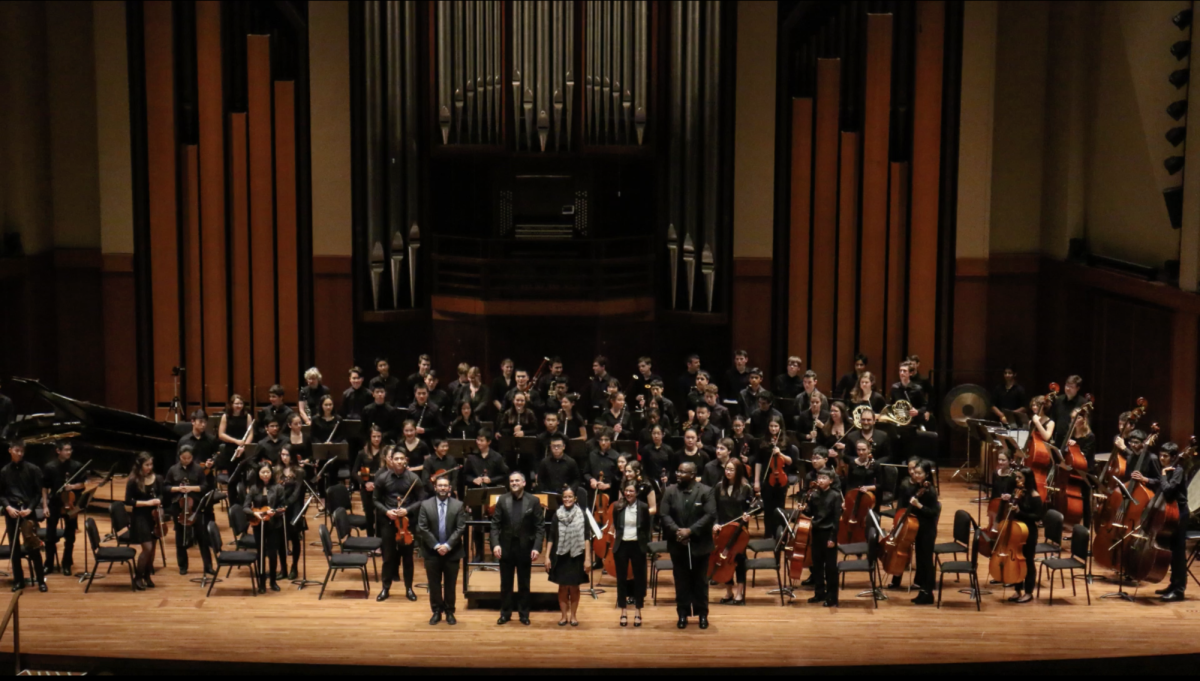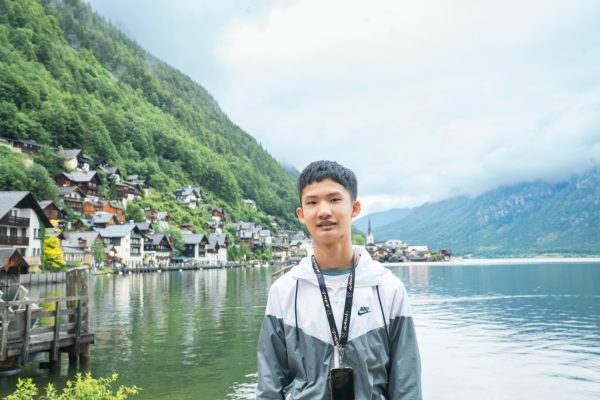The sounds of tuning, rapid major and minor scales, and chatter come together in a cacophony of sounds that represent excitement and energy at the beginning of each orchestra rehearsal. Then the conductor raises a hand, and the concertmaster stands up for tuning — the room goes silent.
Many Lakeside musicians are familiar with this, not only from their experiences in the Lakeside orchestra/ symphony, but also because of their rehearsals with SYSO each week. SYSO, the Seattle Youth Symphony Orchestra, is an organization that has grown rapidly in recent years, to include everything from programs such as the Seattle Conservatory of Music and Portugal Tour to partnerships with Pacific Northwest Ballet and Seattle Symphony.
Currently, SYSO maintains six orchestras open to high school students, five of which rehearse on Saturdays at Shorecrest High School, and are grouped as the “Saturday” orchestras, and one of which — MY Southeast, rehearses at Aki Kurose Middle School and was established recently to increase accessibility. To illustrate, in order to participate in the Saturday orchestras, students have to submit a video audition, and they will either be rejected, or placed in one of the five orchestras, which are grouped by level. From least to most advanced, they are Prelude, Symphonette, Debut, Junior, and Youth. MY Southeast, conversely, does not require any auditions, just one year of experience on their instrument, and uses a “pay what you can” model for tuition payment, to remove financial barriers. Lakeside has one US orchestra, which rehearses in the Chapel 2-3 times per week. They will combine with the band this spring to form a symphony. It’s open to everyone regardless of experience, hosts three performances a year, and commonly participates in local festivals around Seattle, such as the UW Orchestra Festival.
SYSO orchestras and Lakeside’s (US) orchestra are similar in many ways — they both aim to play music at a high level, connect the audience, and a lot of dedication and effort is put into each rehearsal and concert. However, I wanted to find out the perspectives of the Lakeside musicians who play in both Lakeside’s orchestra/ band, and in a SYSO orchestra, specifically how their experiences have been different, what they enjoy about each program, and what they think SYSO and Lakeside could improve on.
Oliver T. ’28 (OT): What instrument do you play, and how many years have you been a part of SYSO?
Princeton K. ’28 (PK): Violin, 5
Matthew K. ’28 (MK): Violin, 3
Chanseop Y. ’28 (CY): Violin, 4
Emil K. ’28 (EK): French horn, 4
Maia F. ’27 (MF): Violin, 5
Makayla L. ’28 (ML): Cello, 3
Amber P. ’27 (AP): Flute, 1
Kabir S. ’27 (KS): Viola, 4
OT: What are some differences between Lakeside’s orchestra/ band program and SYSO? How has your experience between the two differed?
PK: “Seating auditions, for one. SYSO is almost always a symphony orchestra, so it’s never just strings, SYSO also does it a little more hands-on, i.e. coaching. Sectionals at Lakeside only happens once in a while, whereas at SYSO, it’s very integrated. Lakeside cares about the variety of skills, and that everybody matters, but at SYSO, it’s like an afterthought. At Lakeside, [the music program] is truly inclusive to everyone.”
MK: “SYSO is much more centered on staff instruction rather than student instruction—there are very few opportunities for direct student-student leadership, whereas Lakeside’s section leaders direct our sectionals and are trusted with more responsibility (though that may change slightly with YLP [Youth Leadership Program] this year)”.
ML: [MY Southeast] is a lot more of a community orchestra, there’s a lot less competition there. I guess in that sense, Lakeside’s orchestra definitely has people with a lot higher expectations. Another difference is just the tradition, since our orchestra class seems to focus a lot more on traditional classical pieces, whereas MY Southeast tends to focus more on pop and rock, and that’s also different from a lot of other SYSO orchestras.
KS: First of all, the pieces that we’re allowed to play in youth have a lot more depth — they’re epitome of classical music, i.e. Mahler 5, Brahms 4, we don’t play as much contemporary stuff, whereas in Lakeside, we play a lot of contemporary stuff. Both are important though.
AP: There’s a lack of community, it’s very competitive in SYSO — everyone’s just trying to move up/get first chair and appear good to everyone else, so we don’t really talk to each other. In a school band or orchestra, there’s a much deeper community, since everyone chooses to play in band [or orchestra], and it’s less competitive.
OT: Adding on, what do you think Lakeside/SYSO can improve on, and how could they learn from each other?
MK: I think something Lakeside could work on is having more teacher-centric coaching. A lot of the learning happens through students, and while that is a very good thing, I think there is a balance between student and faculty instruction that could be better explored. As for SYSO, definitely participation in larger festivals and recording opportunities, more tours, and more student involvement in decisions of what pieces are being performed and musician opportunities. SYSO could use its vast connections to allow musicians to easily find external volunteer opportunities, masterclasses, and other resources and events. “Behind-the-scenes” and apprenticeship-like positions for conducting, archival work, composing, and management/administration could be a great bonus.
CY: Lakeside could improve on making the orchestra more engaging, but not more competitive. SYSO could work on having better coaches attendance.
EK: “At SYSO, a lot of people just don’t show up to rehearsals, so sometimes we’re missing 30 players, and we can’t really play our best if we’re missing people. At Lakeside, it’s part of school, so if you miss band, it’s like you miss an entire period of school. SYSO can also be really rigid, like you have to do things a certain way, and certain coaches/conductors want things a certain way, and they are really — it’s really strict, whereas Lakeside’s culture/values are really about kindness and empathy, and inclusive, and that contributes to a friendlier atmosphere. However, at Lakeside, a lot of people are starting the instrument brand new, and I think it would be useful if the first few months of band are just sectionals with a coach, where you’re just being taught the fundamentals. Even in 7th and 8th grade band, we were struggling with the basics.”
MF: Lakeside can do a better job of getting everybody’s skill to the same baseline so we can play harder repertoire, but SYSO can also do a better job to build a better community, because I feel like a lot people can come to SYSO and get really competitive — it can get toxic, just chilling out more would be nice.
OT: What do you enjoy most about Lakeside and SYSO?
EK: Teachers (especially at the Upper School) really want you to succeed, and are there for you to help you as a resource, and are really kind and thoughtful. For SYSO, it’s like my place to relax after a long week, it’s something that I look forward to every week — after a week with lots of homework, quizzes, and tests, I come to a space where I can become part of an orchestra where everyone has a part, and everyone belongs, and we can make some really beautiful music, and I’m really thankful for that experience.
CY: My friends, because without SYSO and Lakeside, I wouldn’t have met the people that I’m closest to right now.
AP: Lakeside music meets more often, so we have more chances to work on things, and get to know each other as an ensemble. There are definitely some really good people in the Lakeside orchestra and band, and that’s cool to see. The biggest thing I really like about SYSO is how many opportunities I get to play, and the opportunities for me to learn and grow as a musician is more than I got with Lakeside music.
KS: A lot of my friends in Lakeside orchestra are really talented at other things as well, and it’s fun to see that they can be talented at other things, and also really good at playing their instrument, it’s like a meeting point for a bunch of different skills, outside of just orchestra. SYSO’s super different, a lot of people that go to SYSO are just more committed. Lakeside orchestra is kind of a breather for the day, so it’s kind of an exhale, where I can relax and think that I don’t have to work as hard during this class.
SYSO and Lakeside are distinct programs that bring their own strengths. For example, on differences in coaching, Ms. J notes, “I’m actually saving most of the coaching funds for the chamber music unit, so that the groups can get some really great coaching. So that’s why we haven’t had adult sectional coaches. We will also have coaches coming in for sectionals later this year. But obviously we don’t have the same funds for that as SYSO does, so it’s never going to be as regular.” Still, they share one noble purpose, and as Aaron Copland once said, “So long as the human spirit thrives on this planet, music in some living form will accompany and sustain it.”


